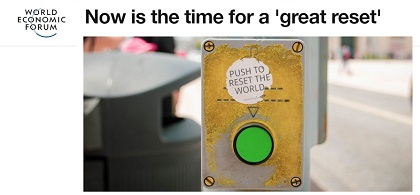The Australian Alert Service is the weekly publication of the Australian Citizens Party.
It will keep you updated on strategic events both in Australia, and worldwide, as well as the organising activities of the Citizens Party.
To subscribe to the Australian Alert Service, it's easy, and it's secure.
Click here for subscriptions within Australia
Click here for overseas subscriptions
Lead Editorial
21 October 2020
Vol. 22. No. 42
IMF Managing Director Kristalina Georgieva’s 15 October IMF-World Bank gathering speech was titled, “A New Bretton Woods Moment”. She did not, however, provide a notion of reviving the Franklin Roosevelt-era Bretton Woods design, never fully realised due to his untimely death not long after the original July 1944 summit (back page). Instead she implied the globalist utopianism that the club of private business and banking elites known as the Davos World Economic Forum has been advocating for years.

Georgieva praised the US$12 trillion worth of moneypumping interventions by governments and central banks made during 2020 and said she was encouraged by G20 initiatives to resolve debt issues. She bragged about new IMF lending, yet the IMF continues to attach prohibitive conditions such as austerity and budget cuts to its loans to developing countries (Almanac).
The mad March money pumping that Georgieva praised, just like the post-2008 quantitative easing, did not foster the development of the real, productive economy, let alone an increase in the productivity of the labour force or scientific and technological advance. Most economists, of all schools, do not understand that the creation of real wealth cannot be measured in terms of dollars.
The designer of US President Barack Obama’s 2008 crisis response, Chief of the Council of Economic Advisors Christina Romer, told Congress in 2009 that FDR’s New Deal had been a failure, but that Obama’s “Stimulus Act” in conjunction with plans of the US Federal Reserve would dramatically reduce unemployment. It did not happen.
Hitler’s Economics Minister, Hjalmar Schacht, a protégé of Bank of England head Montagu Norman (1920-44), pioneered this kind of money pumping—in partnership with the biggest financial and military-industrial corporations—and was admired by British economist John Maynard Keynes for it at the time. No regard was paid to whether Schact’s “work creation” schemes to drive full employment were oriented to growing the real economy; the work, of course, was increasingly carried out in Nazi labour camps.
Asked about the role of the IMF post-2008, then-IMF Managing Director Dominique Strauss-Kahn replied: “Keynes saw what was needed: but it was too early. Now is the time to do it.” In an article published by the World Economic Forum, “Imagining a new Keynesian Bretton Woods”, former Finance Minister of Greece Yanis Varoufakis suggested he was endorsing the British alternative to Roosevelt’s conception, presented by Keynes at the 1944 summit. This proposal included a global bank with its own global currency, the bancor. In her 15 October address, Georgieva twice quoted Keynes, who admitted his theories were “much more easily adapted to the conditions of a totalitarian state” than the free market system.
Carrying forward the Montagu Norman tradition, thenBank of England governor Mark Carney endorsed the Keynes approach at the August 2019 Jackson Hole summit of central bankers, with his proposal for a global digital currency. (“Bank of England’s Carney channels Keynes”, AAS, 4 Sept. 2019.) Fitting perfectly with the banker’s model was investment manager BlackRock’s proposal at the same event, for monetary regime change, whereby private investment banks run government fiscal policy—since taken up in the unprecedented Fed-Treasury cooperative financial interventions to prevent a March financial blow up. No substantial economic growth has come of it. (p. 9)
Only injections of public credit into the real economy, to build the productive capacities we desperately need, can provide the reset the economy requires. (p. 4) Debt can be repaid easily if the economy is thriving, as Australia’s did post-WWII. It can be rolled over into new debt to fund major projects, as Alexander Hamilton did when the young American republic was founded. It can be reorganised as FDR arranged for countless banks following the 1929 collapse. And it can be suspended or forgiven, as China has arranged for many African nations. This is the worthwhile, as opposed to the utopian, concept of a New Bretton Woods.
In this week's issue:
- Lower lending standards will send lambs to slaughter
- Infrastructure all talk without a national development bank
- Develop a northern Australian food bowl
- Why do we trust public health to Big Four global accountants?
- Human rights cartel dominates fixed Magnitsky inquiry
- March meltdown dwarfed September precursor!
- Ghosts of 2008 loom in securities markets
- A timely argument for Glass-Steagall
- RAND Corp., as MAD as ever, plots Russia’s downfall
- Eisenhower on the military-industrial complex
- Hacked docs prove Syrian ‘moderate rebels’ a British propaganda construct from day one
- Make bail-in the issue!
- What a New Bretton Woods should look like
- ALMANAC: Starvation threatens 270 million people
Click here for the archive of previous issues of the Australian Alert Service







